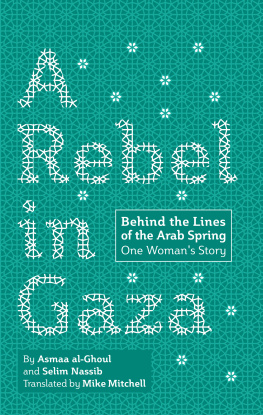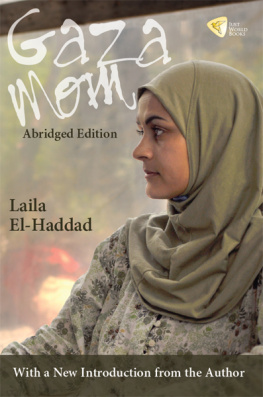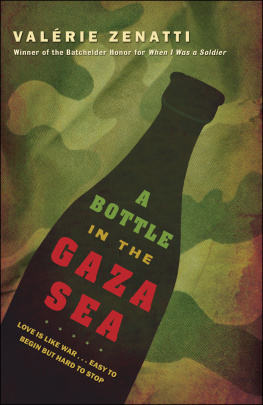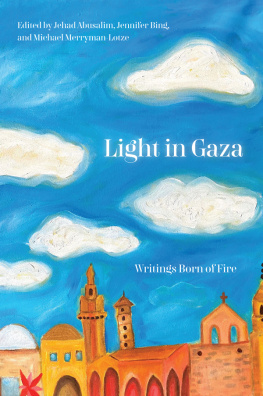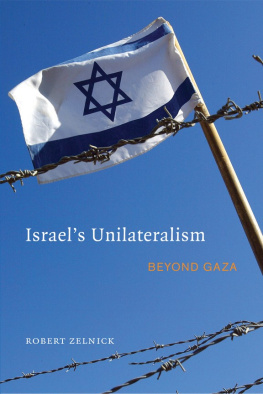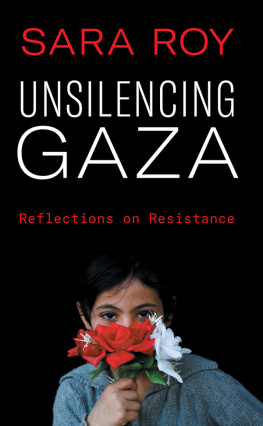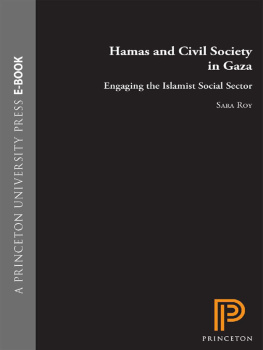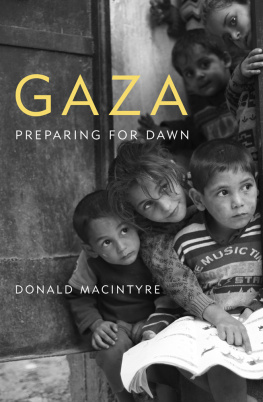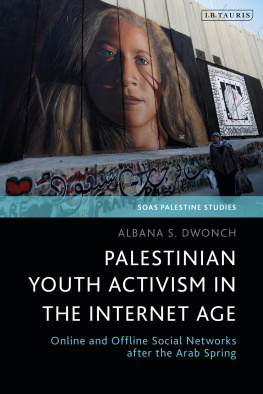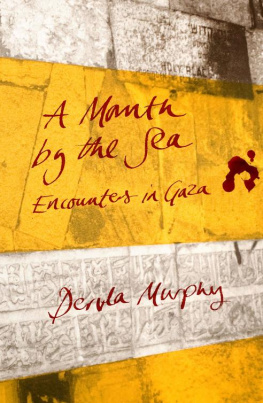
A REBEL IN GAZA
Asmaa al-Ghoul and Selim Nassib
A Rebel in Gaza
Behind the Lines of the Arab Spring, One Womans Story
Translated from the French by
Mike Mitchell
DoppelHouse Press | Los Angeles
A Rebel in Gaza: Behind the Lines of the Arab Spring, One Womans Story
By Asmaa al-Ghoul and Selim Nassib
Translated by Mike Mitchell
DoppelHouse Press, 2018
LInsoumise de Gaza by Asmaa al-Ghoul and Selim Nassib
Calmann-Levy, 2016
Cet ouvrage a bnfici du soutien des Programmes daide la publication de lInstitut franais. / This work, published as part of a program of aid for publication, received support from the Institute Franais.
Cover design: Kourosh Beigpour
Typesetting: Carrie Paterson and Jody Zellen
Publishers Cataloging-in-Publication data
Names: al-Ghoul, Asmaa, author. | Nassib, Slim, author. | Mitchell, Mike, translator.
Title: A Rebel in Gaza : behind the lines of the Arab Spring, one womans story / Asmaa al-Ghoul and Selim Nassib ; translated from the French by Mike Mitchell.
Description: Los Angeles, CA: Doppelhouse Press, 2018.
Identifiers: ISBN 9780998777023 (Hardcover) | 9780998777054 (pbk.) | 9780998777085 (ebook) | LCCN 2018937177
Subjects: LCSH al-Ghoul, Asmaa. | Palestinian Arabs--Biography. | Women, Palestinian Arab--Biography. | Feminists--Gaza Strip--Biography. | Journaists--Gaza Strip--Biography. | Arab-Israeli conflict. | Women--Gaza Strip--Social conditions. | Women and war--Gaza Strip. | BISAC BIOGRAPHY & AUTOBIOGRAPHY / Women | BIOGRAPHY & AUTOBIOGRAPHY / Editors, Journalists, Publishers | BIOGRAPHY & AUTOBIOGRAPHY / Personal Memoirs | BIOGRAPHY & AUTOBIOGRAPHY / Social Activists | HISTORY / Middle East / Israel & Palestine | POLITICAL SCIENCE / Human Rights | POLITICAL SCIENCE / World / Middle Eastern
Classification: LCC DS110.G3 A576 2018 | LCC 956.94/05/0924

| DoppelHouse Press | Los Angeles, California |
To the Rafah refugee camp that my grandparents built and that in turn gave birth to me, the scene of my first smile.
Contents
by Selim Nassib
by Asmaa al-Ghoul
Preface by Selim Nassib
A Woman Emerging from an Alley
S HE SUDDENLY EMERGES from an alley in Cairo and flings her arms around your neck. You dont know her, youve never seen her before. The man shes with has told her who you are and shes run over to you; her laugh enfolds you, her eyes are shining, shes looking at you, searching for something you once wrote about Umm Kulthum that she liked, or something else, a detail, some sign that tells her youre one of her people, one of those to whom she can talk freely.
It was toward the end of 2011, the pulse of the Arab Spring was still beating. Asmaa al-Ghoul, a Palestinian writer from Gaza, was staying temporarily in Cairo to keep out of the public eye for a while. Some years previously she had publicly opposed her uncle, a commander in the Hamas forces, more or less accusing him of being an assassin in an open letter posted on the internet. A further reason for this voluntary move away: the exhausting pressure she was subjected to day after day and which, oddly enough, surprised her. For what she writes is infused with a kind of ingenuousness, the innocent expression of an inner feeling of rebellion against the enforced islamization, the so-called crimes of honor, the sexist segregation Its not her fault that her nature is in all respects incompatible with the stifling regime prevailing in Gaza. A Muslim, a believer if non-practicing, it would be very wrong to define her solely by her opposition to Hamas. She cannot find words scathing enough to denounce the boundless corruption of Fatah, the criminal inhumanity of Israeland her criticism extends to the human rights organizations, the feminist movements, the international institutions, Europe, the United States, all of whom are more or less complicit in a corrupt system which ultimately keeps things as they are. With whom, then, does she side? With the humble folk, the rebels, the ordinary, anonymous people of Gaza. Confronted with the allpervading male chauvinism, besieged and bombarded by Israel, subjected to the obscurantist regime of Hamas, she is at the focal point of all possible oppression in the Arab worldand her vibrant energy absorbs and rejects them all.
The ordinary little restaurant to which she drags me off is in a narrow rising passageway with the tables on the steps. The kitchens out in the open air, the cook is a friend of hers. Asmaa al-Ghoul makes friends easily and talks to everyone in the same way. She has a natural ease and exuberance which allows her to say what she thinks without seeming aggressive.
Childhood in the Rafah refugee camp, first Intifada at five, Israeli soldiers hammering on the door in the middle of the night, uncles joining Hamas and imposing its moral order at home, father often absent (he works in the Emirates) but tolerant, keen on reading, writing She tells me everything, and her portrait is in the first issue of LImpossible, the magazine launched in Paris by Michel Butel. She says, I think the real occupying forces are the internal ones, Hamas, Fatah, the parties then comes the major occupation: Israel. We cant get rid of the latter without first of all getting rid of the former. To be honest, we are being subjected to a siege of the mind that is much more important than the siege on the borders.
She returns to Gaza and continues to follow this nuanced radical line which makes her into a target from all sides, but she just cant change. She gets blows and death threats; she is put in prison, where the Hamas policewomen hit her with the aim of turning her into a good Muslim; she remains one of the rare Gazan women who refuse to cover their heads because they havent read anything in the Koran that obliges them to. This inability to compromise even affects her private life, especially her relationships with men: just thirty years old and her two marriages have both ended in divorce.
She keeps saying that she isnt heroic, that she has no desire to be so. Her dream, still unfulfilled, is to be an ordinary woman, to have a husband, children, a quiet life, lovebut that is a fantasy beyond her grasp, an aspiration quickly thwarted by her fiery temperament, her inability to submit. She no longer has any desire to be a militant, she refuses the appellation of feminist; her activity as a journalist takes her away from her vocation of writer. She is still trying to find her way in literature even though her first collection of short stories, Sparation sur un tableau noir (Segregation on a Blackboard), was well received. Her second, La Ville de lamour et du pch (The City of Love and Sin), is still too realist for her; she refuses to hand it over to her publisher in that state.
Starting with that first meeting in the restaurant on the steps there was tacit understanding between us. But the book we planned to write together came up against practical problems. Go and see her in Gaza? The military regime that has established itself in Cairo again has closed its border with the enclave, and Israels invariable reply to my request for a transit visa is that it is under considerationit still is today. Invite her to come to France? Her suitcase is quickly packedbut the border remains closed week after week. I really come to understand what Gaza, the open-air prison means. But everything works out: one day she manages to get into Egypt and takes the plane. In a house in Normandy she starts talking again, under the eyes of grazing cows, and doesnt stop. She speaks in Arabic, I write it down in Frenchthen she gets me to translate it all back. What she describes is the daily life of a society run by Hamas: how people fall in love, get married, suffer repeated wars, go down to the beach, cycle, smoke their hookahs under that yoke. She responds point by point to their claim to subject life to a stupid order. Or rather it is she herself, the woman she is, her Islam, the nuances of her thought, the very possibility of her existing that are the reply to the Islamism that reigns supreme. This daughter of Gaza doesnt just talk superficially and her criticism is not theoretical: she pulls a thread and everything comes. She doesnt claim to have a solution to offer but simply bears witness to the fact that she and those of her generation who are like her are very much alive. At least so far.
Next page
